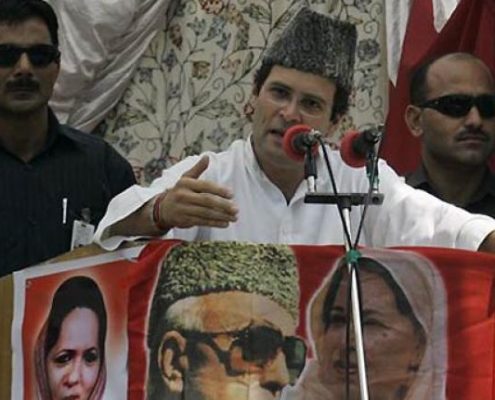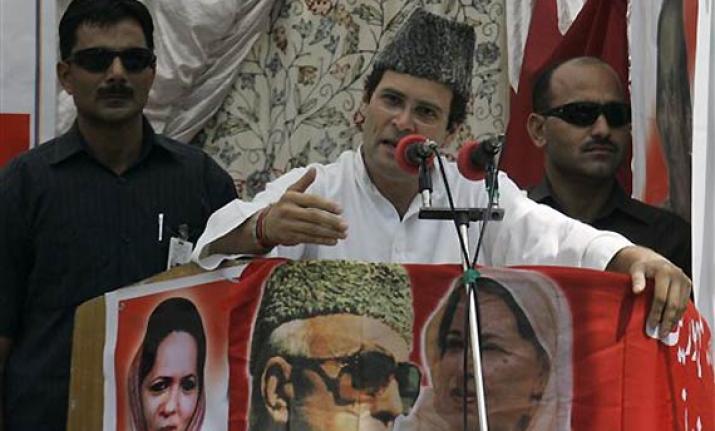A piece of news has barely scratched the surface of our consciousness. It involves a powerful and influential local cleric from Bareilly’s Dargah Aala Hazrat seminary issuing a fatwa against a woman, asking locals and the faithful to ostracize her. Nida Khan, according to the cleric, has committed a “grave crime”. A victim of ‘triple talaq’, Nida had the temerity to campaign against the practice of instant divorce in Indian Muslim communities.

Congress president Rahul Gandhi. PTI
What makes Nida’s “crime” even “greater” is that she runs an NGO in Bareilly, Uttar Pradesh, through which the courageous crusader supports Muslim women — a voiceless, marginalised group on the fringes of community space — who have been victimised by triple talaq or ‘nikah halala’ (the custom that dictates that a divorced couple can remarry only if the woman marries another man, consummates her new marriage and then proceeds to divorce).
According to a nation wide survey involving over 4,700 married Muslim women across 10 states conducted by Bharatiya Muslim Mahila Andolan (BMMA) — a women’s rights organisation that has been at the forefront of the fight against triple talaq, polygamy and nikah halala — more than 90 percent respondents want the ritual of instant divorce and polygamy to be banned in India. The survey also showed that 88 percent Muslim women favour divorce through “talaq-e-ahsan” — a practice spread over three months and involving negotiation.
In a landmark ruling in April last year, a five-judge bench of the Supreme Court had set aside the Hanafi tradition of triple talaq as a “manifestly arbitrary” practice not covered by Article 25 (freedom of religion) of the Constitution. In delivering the judgment, justice Rohinton Fali Nariman had observed that it is “not possible for the court to fold its hands when petitioners (Muslim women) come to court for justice,” according to a report in The Hindu.
For Nida’s “crime”, however, cleric Mufti Afzaal Razvi wrote in the fatwa: “If Hinda (Nida Khan) does not apologise, she should be boycotted. Nobody should talk or greet her and people should stop eating with her, should not visit her if she is taken ill and if she dies, they should not read her last prayer or let her be buried in a graveyard,” reported Times of India which claimed to possess a copy of the “fatwa’.
The newspaper report also mentions that Nida suffered a miscarriage after allegedly being beaten by her husband in 2015 and she was eventually divorced by her husband through triple talaq a year later. The fatwa forbids Muslims from meeting her. It says: “Any person, including her family and triple talaq victims, who will meet her and do not follow Sharia decision, will stand at the same position as Nida.”
It doesn’t end here.According to a report by ABP News, the Bareilly cleric “ostracized” Nida and another woman — Farhat Naqvi, who happens to be the sister of Union Minister Mukhtar Abbas Naqvi and also runs an organisation to support Muslim women — for daring to raise their voices against triple talaq. The fiery Nida has dismissed the ‘fatwa’ and slammed the All India Muslim Personal Law Board — the self-styled gatekeepers of shariah law. “We don’t accept the AIMPLB but Islam, which came to us 1400 years ago. We will continue fighting for our daughters. These people have always subjugated women but now the time has changed,” the report quoted her, as saying.
The saddest part is, for campaigning against a practice deemed unconstitutional by the Supreme Court and considered un-Islamic in several Muslim-majority nations, Nida has been extended police protection.
There has hardly been any voice in Nida’s support. The self-righteous Left, which has huge similarities with Islamism in its way of controlling the thoughts and actions of its followers and prioritization of group identity over individual rights, is expectedly looking the other way. The liberals are silent because hounding of Muslim women by clerics doesn’t fit into its majoritarian narrative.
The Congress, whose president recently proclaimed himself as the “eraser” of hatred and fear and announced that he stands with the “exploited, marginalised and the persecuted”, is trying his best to scuttle the Muslim Women (Protection of Rights on Marriage) Bill, 2017, so that it doesn’t turn into a law. Introduced by the NDA government after Supreme Court set aside the practice of ‘triple talaq’, the bill seeks to make it easier for Muslim women to approach the law seeking subsistence allowance and custody of minor children. It declares instant divorce as “illegal” and “void”.
I stand with the last person in the line. The exploited, marginalised and the persecuted. Their religion, caste or beliefs matter little to me.
I seek out those in pain and embrace them. I erase hatred and fear.
I love all living beings.
I am the Congress.
— Rahul Gandhi (@RahulGandhi) July 17, 2018
The Bill has been passed in Lok Sabha, where the BJP has a majority. It is stuck in the Upper House because the Opposition wants to send it to a “select committee” for “closer scrutiny”. In reality, it is a delaying tactic by the Congress-led Opposition which has been caught in a no man’s land. The Opposition is non-committal and desperate to buy time because it doesn’t want to be seen coming out against a legislation that seeks to address legitimate grievances of Muslim women. On the other hand, it is wary of backing the Bill and courting the ire of the powerful mullahs’ club.
If Rahul Gandhi was truly the fellow traveler of the “exploited, marginalised and the persecuted”, he would have led Congress in unconditionally backing the triple talaq Bill and undoing his father Rajiv Gandhi’s historic blunder who — in order to appease male Muslim leaders — used his brute majority in Parliament to overturn a Supreme Court verdict in 1986 and deny Shah Bano Begum, a poor, septuagenarian, divorced Muslim woman her alimony.
On Congress’ decision to block the triple talaq Bill in Rajya Sabha, former Union minister Arif Mohammad Khan who resigned from the Rajiv Gandhi cabinet in protest against the decision to overturn the Shah Bano verdict, had this to say to India Today: “The Congress party is acting at the behest of Muslim Personal law board, the way its members have congratulated Congress is a testimony to this and it is a very unfortunate situation… Congress party doesn’t care about victims and individuals, but those who promise vote bank, like the Muslim personal law board.”
What the fatwa against Nida and the fate of triple talaq Bill tells us is that the fate of real minorities — such as Muslim women — remains endangered in India because the political system is unable to help them and the civil society finds it easier to indulge in pop activism than tackle uncomfortable realities and lived experiences.
Hashtag campaigns such as #TalkToAMuslim dominate social media — championed by the likes of actor and globally acclaimed public intellectual Swara Bhasker — that are condescending (if well-meaning), reductive and serve to alienate Muslims further through an exclusive focus on religious identities. Instead of such bubblegum activism in echo chambers, it might be worthwhile listening to the voices of courageous Muslim women in India who are still being persecuted for resisting obscurantist practices propagated by misogynistic men. Talk to them.




